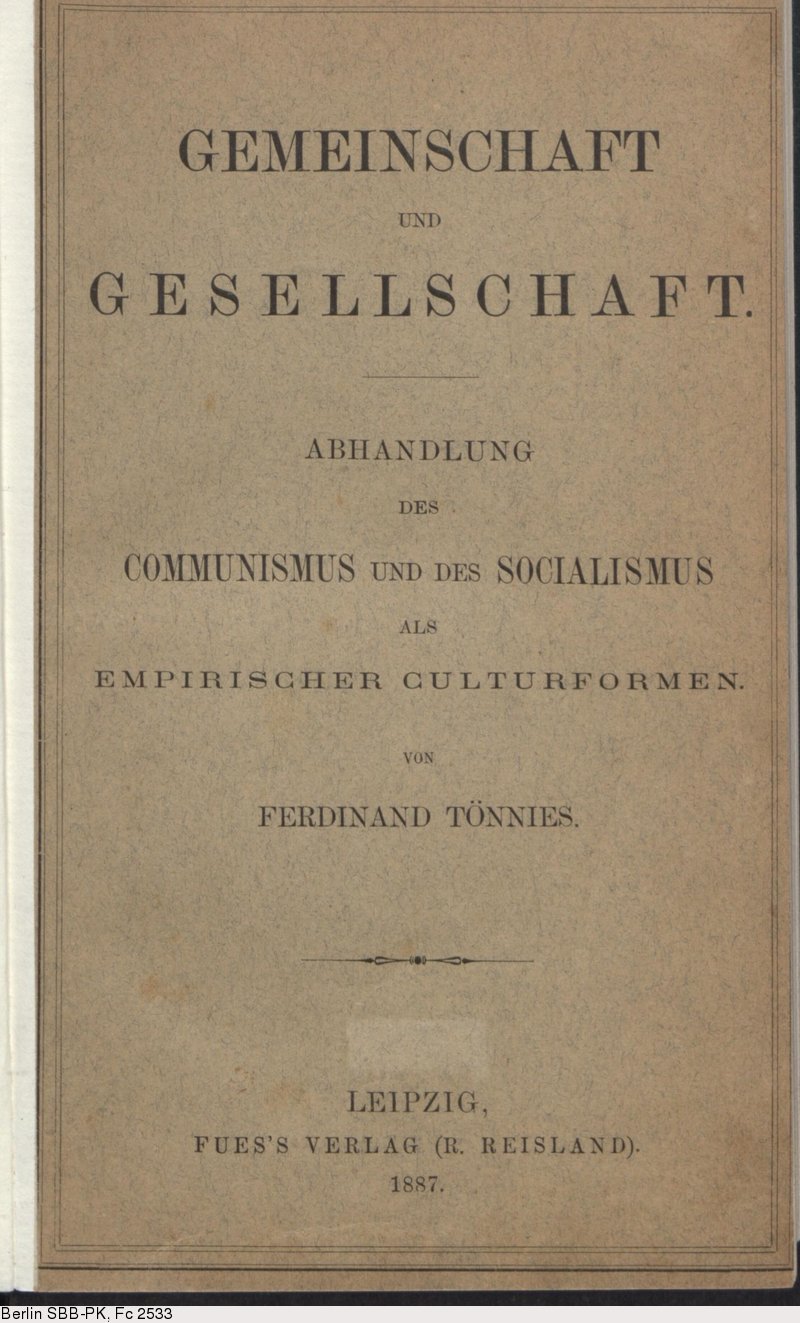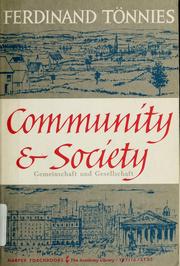I'm a lifelong student of history, which means that I believe that the study of history helps us (me) to understand the present. The world as it is today is an outcome of what has gone before. The past does matter, as it is a hint to the future.
 One of my favorite social scientist is Ferdinand Tonnies. He was a turn of the century (1855-1936) German sociologist and he was intensely aware of the world changing around him and that he took note of it; even more, he brought coherency to it. His ground-breaking book was Gemeinschaft und Gesellschaft, which is translated into English as community and society. Max Weber was sufficiently impressed by this work to prompt him to add it to his own research and sociological paradigm.
One of my favorite social scientist is Ferdinand Tonnies. He was a turn of the century (1855-1936) German sociologist and he was intensely aware of the world changing around him and that he took note of it; even more, he brought coherency to it. His ground-breaking book was Gemeinschaft und Gesellschaft, which is translated into English as community and society. Max Weber was sufficiently impressed by this work to prompt him to add it to his own research and sociological paradigm.
Tonnies observed that human society was fundamentally changing with the advent of the Industrial Revolution. Tonnies pointed out that industrialization as a stimulus for social change was as significant as the Neolithic Revolution. Tonnies noted these changes and recorded his observations in the work noted above.


Since the advent of the Industrial Revolution, human society has been in an extended transition phase. This process is not complete and while there is no timeline as to when it will be complete, its impacts are evident. My goal in the next few posts is to examine society today through the lens of Gemeinschaft vs Gesellschaft.
Industrialization saw the transformation of society (at this point, mostly the Western world, but increasingly across the developing world) from one that is predominantly agrarian and rural to one that is urban. This change generated huge and lasting changes to all areas of human psycho-social development and the resultant social change, including paradigms of self-perception (personality development and sense of self) to how families and communities are structured.
How had American society changed since 1867 when Laura Ingalls Wilder was born? How has American society changed since her death in 1957? Wilder was born into a world where the primary means of transportation in the upper Plains was by wagon and/or railroad. And she died in a world of jet-powered airliners and nuclear bombs. This is change in technology. And although technology greatly influences the construction of human society, do not conflate the two. And the pace of social change continues.
What this means is that people have increasingly lost those familial and community connections which are ideal and necessary for healthy human psychological and sociological development. We can only imagine the depth and breadth of interconnectivity that a Gemeinschaft community offered its members and which is impossible to establish in a Gesellschaft one. In a small Gemeinschaft community everyone knew each and protected the other, whereas as in our modern Gesellschaft cities, for example, a person can be surrounded by a million others, but still be isolated and alone.
I wonder if human beings are psychologically designed to function best in a Gemeinschaft society, rather than any alternative. Not that Gemeinschaft societies were perfect, e.g. imagine living in a community where gossip is an effective social control. But people were never without the support of family --- not just "others," but family. I believe that humans are meant to live in Gemeinschaft communities and outside of this humans cannot develop normally; that is, in a psychologically healthy way.
Interestingly, as industrialization brought about the decline of Gemeinschaft communities in the United States, settlers in the West or the first generation of industrial workers in the cities founded substitute communities, as subconscious attempts at reestablishing those human connections recently lost. Thus we see in the 19th century the burgeoning growth in self-selecting social groups, such as fraternal societies, labor unions, and other groups that brought its members into new interpersonal relationships recently lost. But these cannot substitute for the structure of Gemeinschaft society. They only reflect the subconscious need to connect with others.
Subsequently, with the advent of Gesellschaft society and the destruction of Gemeinschaft communities, the collective psychoses of American society becomes apparent. And increasingly. With the loss of the Gemeinschaft family at its base, and further strengthened through Gemeinschaft community, modern society is hopelessly condemned to unraveling. As proof, pick your psychosis! Examine any psycho-social issue, from sexual abuse to drug use, and the steady increase from one generation to the next becomes apparent. Our modern human society is unwinding because we have, individually and collectively, created a toxic and unnatural alternative. The human species cannot survive its Gesellschaft reality.
This might sound simplistic, but it hardly is. Humans have existed in Gemeinschaft communities since time immemorial and, in the West at least, have only experienced Gesellschaft society with the advent of the Industrial Revolution.
To be continued...
 One of my favorite social scientist is Ferdinand Tonnies. He was a turn of the century (1855-1936) German sociologist and he was intensely aware of the world changing around him and that he took note of it; even more, he brought coherency to it. His ground-breaking book was Gemeinschaft und Gesellschaft, which is translated into English as community and society. Max Weber was sufficiently impressed by this work to prompt him to add it to his own research and sociological paradigm.
One of my favorite social scientist is Ferdinand Tonnies. He was a turn of the century (1855-1936) German sociologist and he was intensely aware of the world changing around him and that he took note of it; even more, he brought coherency to it. His ground-breaking book was Gemeinschaft und Gesellschaft, which is translated into English as community and society. Max Weber was sufficiently impressed by this work to prompt him to add it to his own research and sociological paradigm.Tonnies observed that human society was fundamentally changing with the advent of the Industrial Revolution. Tonnies pointed out that industrialization as a stimulus for social change was as significant as the Neolithic Revolution. Tonnies noted these changes and recorded his observations in the work noted above.


Since the advent of the Industrial Revolution, human society has been in an extended transition phase. This process is not complete and while there is no timeline as to when it will be complete, its impacts are evident. My goal in the next few posts is to examine society today through the lens of Gemeinschaft vs Gesellschaft.
Industrialization saw the transformation of society (at this point, mostly the Western world, but increasingly across the developing world) from one that is predominantly agrarian and rural to one that is urban. This change generated huge and lasting changes to all areas of human psycho-social development and the resultant social change, including paradigms of self-perception (personality development and sense of self) to how families and communities are structured.
As you can see on the above chart, the evolution of human self-perception changed from the Gemeinshaft community to the Gesellschaft community. This is further elaborated below.
Effectively, Gesellschaft sees a worldview developing that centers on the self, whereas Gemeinschaft centers on the group, such as the community or the family. This change in focus has real world ramifications. For example, in a Gesellschaft community, everyone knows everyone else. I suppose a modern example of this sort of community would be a traditional group such as the Amish. In a Gemeinschaft community, people do not know their neighbors. For example, in an apartment building, a person might know by name the person across the hall, but hardly anyone else. One can live in an apartment complex, a neighborhood, or other similar congregation of habitations, and be surrounded by what are effectively strangers.
I will explore the ramifications of our society's change from Gemeinschaft to Gesellschaft society. It is important to understand that this change in society, for example in the United States, occurred over a very brief period of time. Think of Laura Ingalls Wilder, who was born into a Gemeinschaft society and died in a Gesellschaft one (one could also argue that her generation was the first iteration of a modern Gesellschaft society),
How had American society changed since 1867 when Laura Ingalls Wilder was born? How has American society changed since her death in 1957? Wilder was born into a world where the primary means of transportation in the upper Plains was by wagon and/or railroad. And she died in a world of jet-powered airliners and nuclear bombs. This is change in technology. And although technology greatly influences the construction of human society, do not conflate the two. And the pace of social change continues.
What this means is that people have increasingly lost those familial and community connections which are ideal and necessary for healthy human psychological and sociological development. We can only imagine the depth and breadth of interconnectivity that a Gemeinschaft community offered its members and which is impossible to establish in a Gesellschaft one. In a small Gemeinschaft community everyone knew each and protected the other, whereas as in our modern Gesellschaft cities, for example, a person can be surrounded by a million others, but still be isolated and alone.
I wonder if human beings are psychologically designed to function best in a Gemeinschaft society, rather than any alternative. Not that Gemeinschaft societies were perfect, e.g. imagine living in a community where gossip is an effective social control. But people were never without the support of family --- not just "others," but family. I believe that humans are meant to live in Gemeinschaft communities and outside of this humans cannot develop normally; that is, in a psychologically healthy way.
Interestingly, as industrialization brought about the decline of Gemeinschaft communities in the United States, settlers in the West or the first generation of industrial workers in the cities founded substitute communities, as subconscious attempts at reestablishing those human connections recently lost. Thus we see in the 19th century the burgeoning growth in self-selecting social groups, such as fraternal societies, labor unions, and other groups that brought its members into new interpersonal relationships recently lost. But these cannot substitute for the structure of Gemeinschaft society. They only reflect the subconscious need to connect with others.
Subsequently, with the advent of Gesellschaft society and the destruction of Gemeinschaft communities, the collective psychoses of American society becomes apparent. And increasingly. With the loss of the Gemeinschaft family at its base, and further strengthened through Gemeinschaft community, modern society is hopelessly condemned to unraveling. As proof, pick your psychosis! Examine any psycho-social issue, from sexual abuse to drug use, and the steady increase from one generation to the next becomes apparent. Our modern human society is unwinding because we have, individually and collectively, created a toxic and unnatural alternative. The human species cannot survive its Gesellschaft reality.
This might sound simplistic, but it hardly is. Humans have existed in Gemeinschaft communities since time immemorial and, in the West at least, have only experienced Gesellschaft society with the advent of the Industrial Revolution.
To be continued...







No comments:
Post a Comment